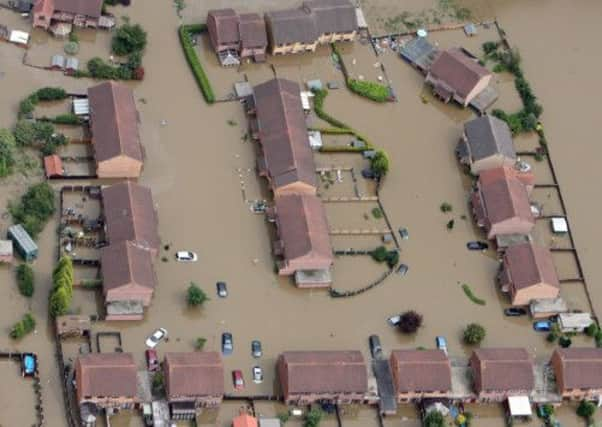Mary Creagh: We need leadership to stem flood of misery for blighted victims of deluge


More than 3,500 properties were hit. Insurers put the damage at somewhere between £1bn and £1.3bn – the highest level since the devastating floods of 2007.
Those 2007 floods hit Yorkshire hard. They were the largest peacetime emergency since World War Two. Around 40,000 homes were flooded, 13 people lost their lives and it cost £3bn in insurance claims and clean-up. Hull, Wakefield and Doncaster all suffered severely.
Advertisement
Hide AdAdvertisement
Hide AdThere was cross party agreement that flood defence spending should rise substantially and, under a Labour government, it did. Yet, in 2010, the Treasury cut £360m from the Defra flood capital budget over four years – a 30 per cent cash cut. Investment in England and Wales’ flood defences fell from £354m in 2010 under a Labour government, to £259m a year for each of the next four years. £9m a year slashed.
That’s why events like this month’s Flood Insurance Conference in York, where 1,200 homes are at risk of being flooded, are so crucial. The challenges are great but Labour councils across the region – in York, Leeds and Calderdale – are leading the way in responding to the dangers of flooding.
Every £1 invested in flood prevention saves £8 later, not to mention the human trauma avoided. Flood defences work. At a time when the construction industry is in deep recession, the Government slashed spending on shovel- ready, locally popular building projects all over the country.
The Government knows they got it wrong. That’s why they used the 2012 Autumn Statement to put an extra £120m into flood defences.
Advertisement
Hide AdAdvertisement
Hide AdYet even with that extra money the Government will still spend less on flood defences in 2013/14 than the Labour government spent in 2008.
Cuts to flood defences also affected the availability and affordability of flood insurance. They opened the door to the insurers walking away from insuring properties in areas of high flood risk.
As such, the Government’s cuts risk leaving towns and cities blighted where people cannot insure, mortgage or sell their homes.
In the past, insurance arrangements were based upon a deal called the Statement of Principles hammered out between the then Labour Government and the insurance industry. The insurance industry ensured universal access to flood insurance for homes and businesses in high flood risk areas. The Government adequately invested in flood defences. We in the Labour opposition have been warning for two years that the Government must work with the insurers to ensure universal flood insurance. The alternative is to leave flood insurance to the free market, which means homeowners could end up with no insurance, no mortgage and unable to sell.
Advertisement
Hide AdAdvertisement
Hide AdThe Building Societies’ Association say that if high flood risk properties can no longer get flood insurance, banks which have mortgages on properties in these areas may experience a drop in the value of their mortgage book.
This could well lead to lenders imposing higher interest rates on mortgages on properties in flood risk areas – or lenders having to hold more money against the risk of those higher risk mortgages defaulting. This would take money out of our economy at a time when the government has been printing money and trying to pump it into the economy.
The Government needs to end the uncertainty facing householders, businesses and the insurance industry, and do a deal.
Instead, incompetent Ministers are playing Russian roulette with people’s homes and businesses.
Advertisement
Hide AdAdvertisement
Hide AdThere is only one serious option on the table: the new model put forward by the Association of British Insurers. This is a new not-for-profit fund which will insure the 200,000 highest risk homes at a set price. So far there is no deal.There will be no replacement insurance scheme in place by July 1 as it would require a new law. Homeowners will face uncertainty, insurance premiums will rise, risk will be injected into the economy.
Labour believes that leaving flood insurance to the free market is neither morally right nor economically prudent. Not right to leave some people without insurance. Not prudent in protecting the taxpayer from huge future bill from uninsured homes and businesses.
Ultimately, catastrophic risk resides with us all as taxpayers. To deny this is short sightedness of the worst kind.
We need leadership from government on flood insurance and a framework that will ensure high-risk properties can get the insurance they need, not another year of kicking the can down the road.